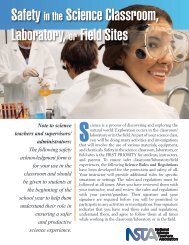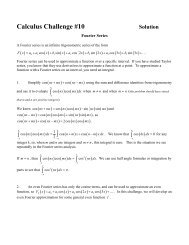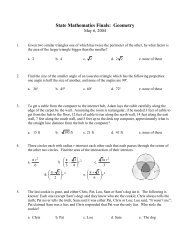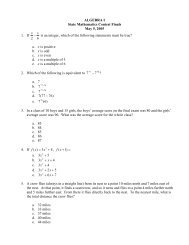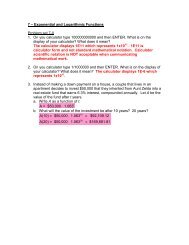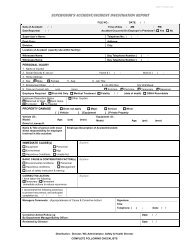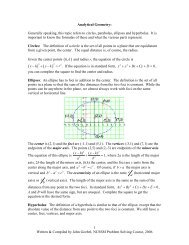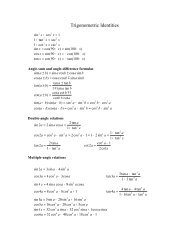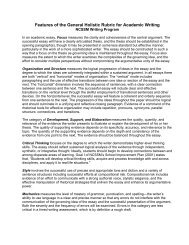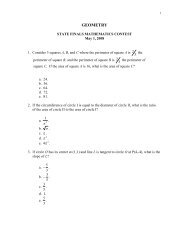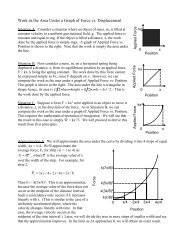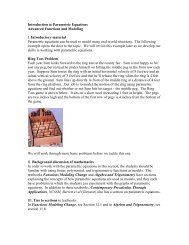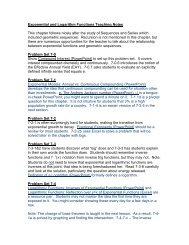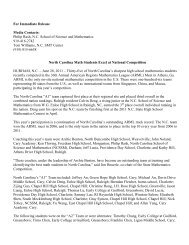NCSSM COURSE CAtAlOG - North Carolina School of Science and ...
NCSSM COURSE CAtAlOG - North Carolina School of Science and ...
NCSSM COURSE CAtAlOG - North Carolina School of Science and ...
You also want an ePaper? Increase the reach of your titles
YUMPU automatically turns print PDFs into web optimized ePapers that Google loves.
cellular structure <strong>and</strong> function common to most eukaryotic organisms. Topics<br />
include cellular components, membrane function, energetics, <strong>and</strong> enzyme<br />
function. Laboratory activities are designed to develop critical thinking skills <strong>and</strong><br />
thoughtful data interpretation.<br />
BI416 Anatomy <strong>and</strong> Physiology II<br />
One trimester<br />
Credit: One unit core biology or core elective credit.<br />
Prerequisite: BI352 Anatomy <strong>and</strong> Physiology I or BI364 Developmental Biology, or<br />
permission <strong>of</strong> the Dean <strong>of</strong> <strong>Science</strong>.<br />
Meeting pattern: Five periods per week including lab.<br />
Building upon the concepts learned in BI352 Anatomy <strong>and</strong> Physiology I, this<br />
course provides an in-depth study <strong>of</strong> the neural <strong>and</strong> hormonal control <strong>of</strong> the<br />
human body. Topics include homeostasis, the disease-state, the nervous <strong>and</strong><br />
endocrine systems, as well as the major organ systems discussed in BI352<br />
Anatomy <strong>and</strong> Physiology I. The laboratory component <strong>of</strong> the course explores<br />
physiological concepts via experimentation.<br />
BI422 Immunology<br />
One trimester<br />
Credit: One unit core biology or core elective credit.<br />
Prerequisite: BI360 Molecular Genetics, or BI410 Molecular <strong>and</strong> Cellular Biology,<br />
or BI434 AP Biology (I), or permission <strong>of</strong> the Dean <strong>of</strong> <strong>Science</strong>.<br />
Meeting pattern: Four periods per week including lab.<br />
This course extends the concepts <strong>of</strong> molecular <strong>and</strong> cellular biology to focus<br />
upon the mechanisms that compose the immune system. We begin with the<br />
general properties <strong>and</strong> development <strong>of</strong> immunity <strong>and</strong> proceed to generation <strong>of</strong><br />
B-cell <strong>and</strong> T-cell responses, immune effector mechanisms <strong>and</strong> the immune<br />
system in health <strong>and</strong> disease. Specific topics include expression <strong>of</strong><br />
immunoglobulin genes, hypersensitivity, leukocyte migration <strong>and</strong> inflammation,<br />
AIDS <strong>and</strong> other immunodeficiencies, autoimmunity, transplantation<br />
immunology, <strong>and</strong> vaccines.<br />
BI424 AP Environmental <strong>Science</strong> (I)<br />
One trimester<br />
Credit: One unit core biology or core elective credit.<br />
Prerequisite: One course in biology <strong>and</strong> one course in chemistry, or one course<br />
in biology <strong>and</strong> one trimester <strong>of</strong> <strong>NCSSM</strong> chemistry, or permission <strong>of</strong> the Dean <strong>of</strong><br />
<strong>Science</strong>.<br />
Meeting pattern: Five periods per week including lab.<br />
66



